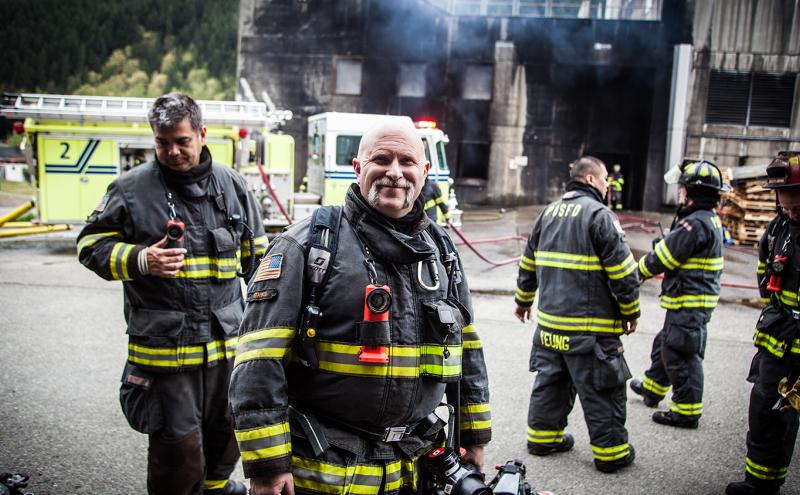
Todd Starkey found the fire service after a successful military career. He was determining his next career move and found himself drawn to the atmosphere of collaboration and team work of those who worked in the fire service. Twenty years later, he is now the Assistant Chief of Operations at the Port of Seattle Fire Department, where he is working to improve communications within the department and support firefighters in their day to day operations.
We sat down with Starkey to talk about his path toward becoming a firefighter, what he loves about his job, how the department is responding to COVID-19, and how he is working to make positive change.
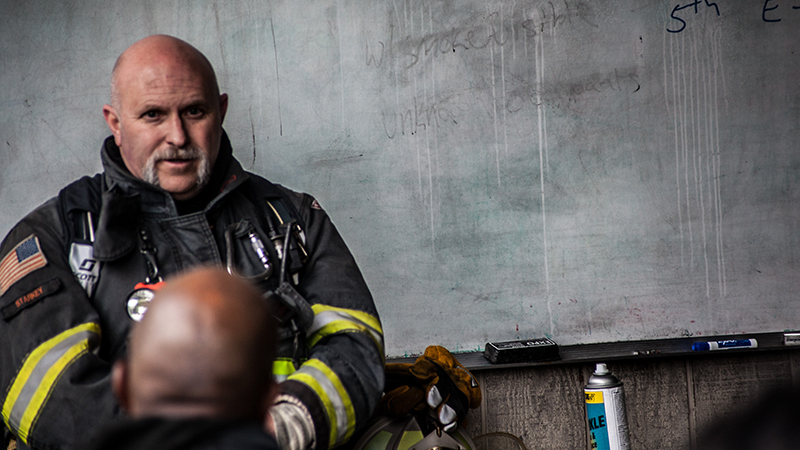
Tell me about your background. How did you end up as a firefighter?
I served in the military and then private industry doing contracting work overseas. When my father got ill, I moved back home to be closer to him and took a position as an Operations Manager at a friend’s furniture design company. Some of the delivery drivers who worked there were Port of Seattle firefighters working a second job. Before that exposure I hadn’t thought of the fire service as a career, even though my grandfather and brother in law were firefighters. I had been leaning toward a career in law enforcement, but I saw how the firefighters interacted with each other and they told me about their work environment. What they described was very similar to what I had experienced during my time in the military. I then started on a career path, becoming a volunteer firefighter and professional firefighter. I’ve now been at the Port of Seattle Fire Department for 15 years.
You were promoted to Assistant Chief of Operations in October 2019. Can you tell me about your journey as a leader?
I went from the rank of firefighter to Captain within our organization; I was eventually promoted to Battalion Chief and spent three and a half years in that role. When the Assistant Chief of Operations position became open, I was initially hesitant to take the position. I really enjoyed working as shift Battalion Chief, and I enjoyed the people I worked with on D-shift. But my coworkers pushed me to take the position because they felt there was a need for leadership and they had full faith and respect for me taking on this challenging role. In the six months I’ve been here, I’ve made quite a bit of progressive change. One of the biggest changes is bringing back accountability to our organization and members, and opening clear lines of communications. We’re making changes on how we respond to certain incidents and ensuring that our mutual aid work with other King County departments is seamless. We are continuing to break down barriers that have been in place to make sure we are training and working cohesively together and with our partner agencies.
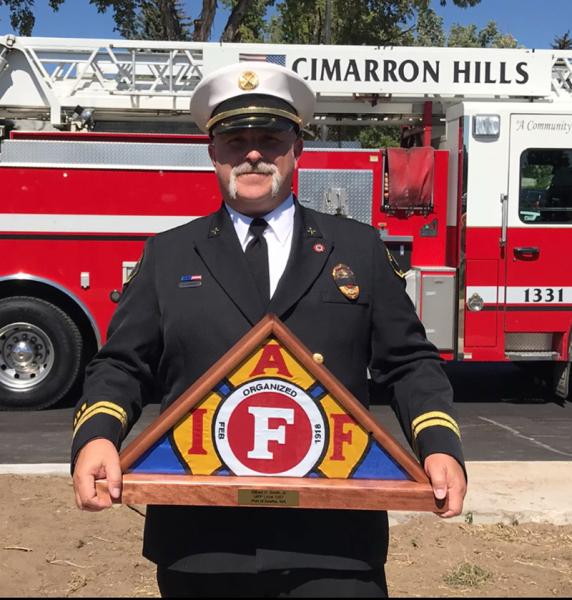
How has COVID-19 impacted your work?
Because this region is an international hub, our department is at the forefront of all infectious disease situations. In the past we have had to respond to cases of avian flu, Ebola, SARS, and MRSA, and currently we respond daily to suspected cases of COVID-19. I’ve taken the stance that responding to this pandemic is not unlike an operational deployment in military. Our members are put in stressful situations daily, seeing infected patients. But In a military operational deployment, team members get downtime where they come back and play sports and joke around. Right now, firefighters currently aren’t getting the downtime they need to recharge because things are changing so much at home and at work. We realize that, so we ensure that our shift leaders talk to their team members about any issues they may be having, offering help, support and possible solutions.
As a leader how are you supporting your team right now?
I haven’t had a day off since the first part of March. I come into work each day to talk to firefighters, and when they come back to work after their days off, I check to see how everyone is doing, relay information, answer questions, and just be present with my team. We’re treating this like we are on a deployment. Like many others, I have a spouse and child at home who I worry about, and a stressor for me is collectively showing support for our members and being visible and present. Leaders must be present for their teams during times of great peril like this.
What is motivating you and your team during this challenging time?
We all want to be there to help others and everyone wants to show up to work. And we are particularly motivated by being there to support our team, whom we consider brothers and sisters.
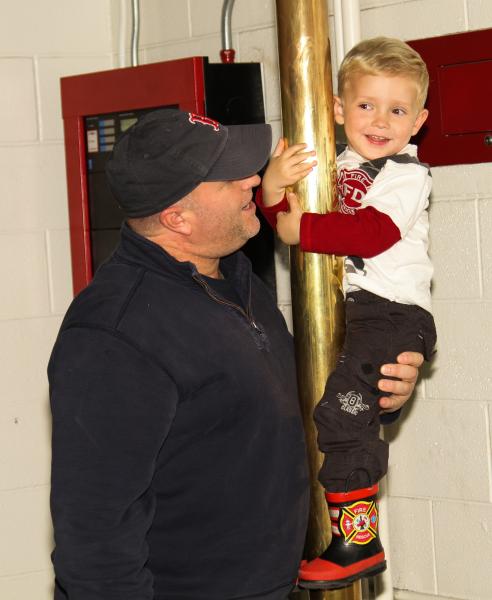
What do you love about your job?
It’s an opportunity to affect change, but it also presents challenges. We’re not your average fire department — we are skilled in structural firefighting, HAZMAT, technical rescue, and aircraft rescue firefighting. My job also includes many elements that I missed from my time in military. We’re very team oriented and at the end of the day I feel like I’ve accomplished something that matters.
What do you love about working at the Port?
We deal with many different people and a high call volume so we’re always busy. I’ve always enjoyed that our fire department is one of the most diverse in Washington state, and is considered one of the most diverse departments west of the Mississippi. Our team includes military veterans, LGBTQ members and many different ethnicities, and I appreciate this diversity of thought and experience — it gives us an important viewpoint of the world and how we conduct business.
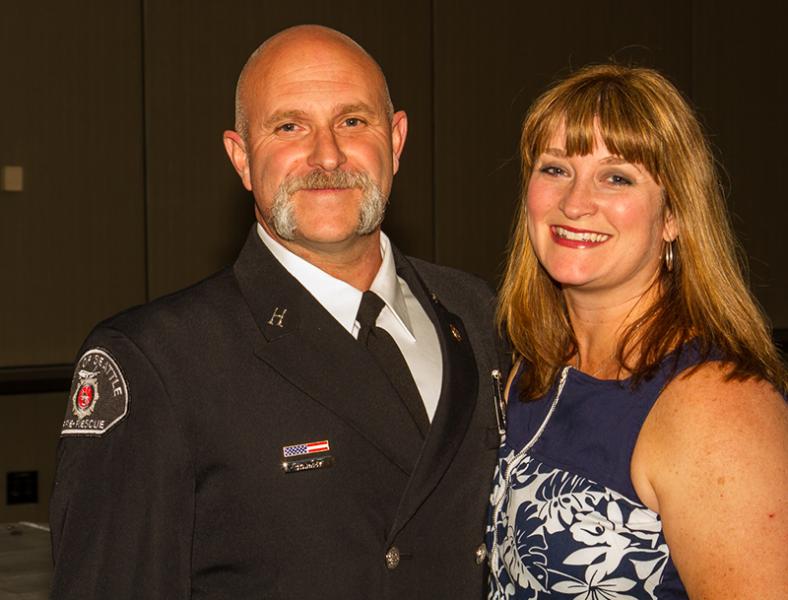
What do you enjoy doing when you aren’t working?
I’m a voracious reader and I read four to five books a week. I love aviation and military history. I also have a 10-year-old son so I spend the bulk of my free time with my wife Jamey on the sidelines of various soccer and lacrosse fields cheering him on. I love to travel and I’m a heck of a wine drinker.
Meet other members of the Port of Seattle Fire Department








